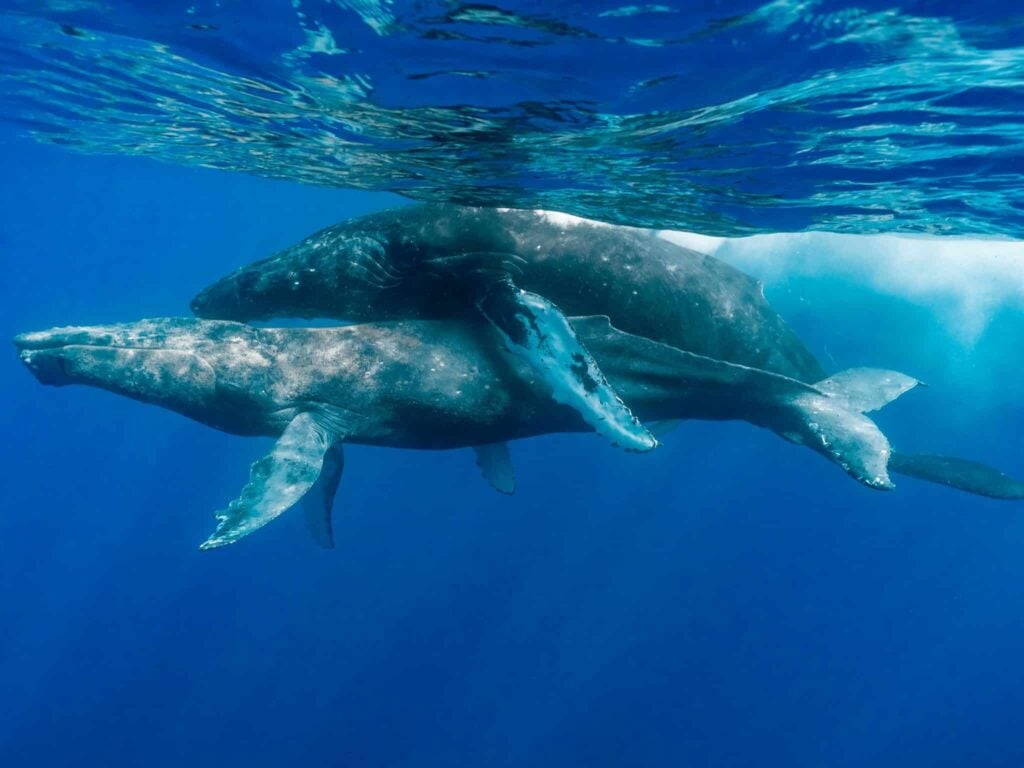

A recent study in Marine Mammal Science discusses the first observed sexual behavior between two male humpback whales off the coast of Maui, Hawaii in 2022.
These images are hugely significant as the report describes: “Despite decades of research on humpback whales around the world, reports of penis extrusion by males are relatively rare … and copulation in humpback whales has not yet been documented …This is the first report of penetration by a humpback whale, and the first report of sexual activity between two male humpback whales.”
According to a press release by the Pacific Whale Foundation “The two whales circled the boat numerous times, allowing Krannichfeld and Romano the opportunity to carefully document the event by holding their cameras over the side of the stationary vessel (note: it is illegal to swim with or approach humpback whales within 100 yards in Hawaii and the vessel remained in neutral as the whales approached).
[FULL STUDY BELOW] Researchers Document First Known Sexual Behavior Between Male Humpback Whales
This observation challenges researchers to perhaps broaden their inquiry as previous understanding and research on humpback whale behavior, has largely focused on reproductive activities.
According to the study, so-called “nonreproductive sexual behaviors,” including those between the same sex, are documented across various animal species. Such behaviors may serve functions beyond reproduction, including social alliance formation, dominance establishment, and tension reduction. This single observation is difficult to generalize from, not only in isolation, but because of one whale was emaciated and injured.

The Significance of This Observation
The health condition of Whale A, described as emaciated and injured, may have influenced the interaction. Previous studies have suggested that weakened or injured animals might become targets for dominant behavior or mistargeted mating attempts. The Foundation release noted the health disparity adds “complexity to this unique observation. One whale's poor condition, possibly caused by a ship strike, may have contributed to the observed behavior.”
The observed whales, identified via tail fluke photographs and genetic analysis, exhibited a unique interaction. “Whale B repeatedly approached from the rear of Whale A and penetrated the second whale, appearing to hold Whale A in place with its pectoral fins,” the researchers detailed.
This behavior, they write, suggests a complex social interaction potentially related to dominance, social bonding, or a mistargeted mating attempt.
Male-Male Interactions Among Marine Mammals
The observed behavior in humpback whales adds to documented instances of same-sex interactions among marine mammals, including pinnipeds and cetaceans like bottlenose dolphins and killer whales. These interactions often involve complex social behaviors, including dominance, alliance formation, and social learning.
The authors emphasized the importance of further research to understand the motivations and implications of such behaviors fully, they noted a “similar observation by Pack et al. (1998), where a humpback whale exhibited sexual activity near a deceased conspecific, adds to the complexity of understanding these occurrences,” they concluded.
The study highlights the significant role of community scientists and the value of opportunistic observations in advancing marine mammal science.


Recommended Comments
There are no comments to display.